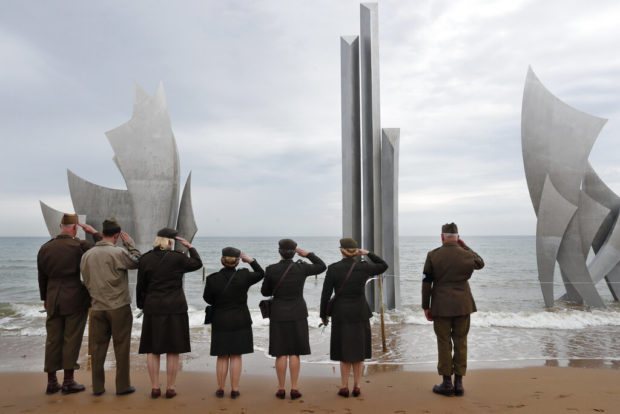Queen, world leaders honor veterans on D-Day anniversary

Enthusiasts of England salute in front of The Brave, a monument dedicated to the American soldiers who landed on Omaha Beach on D-Day, in Saint-Laurent-sur-Mer on June 4, 2019, in Normandy. AP
PORTSMOUTH, England — World leaders including US President Donald Trump are gathering Wednesday on the south coast of England to mark the 75th anniversary of the D-Day landings. But the stars of the show are the elderly veterans of that campaign who say they are surprised by all the attention: They were just doing their jobs.
The Royal British Legion has brought about 300 veterans, aged 91 to 101, to the ceremonies in Portsmouth, where many of the troops embarked for Normandy on June 5, 1944. After a flyover by the Royal Air Force and a salute from the Royal Navy, the veterans will return to the landing beaches overnight, just as they did 75 years ago.
One of those veterans is Harold Wilson who was startled when a young French family stopped to thank him for liberating their country when the old soldiers visited Dunkirk on Tuesday.
“I think it’s amazing after all these years,” Wilson said before the ceremony, proudly wearing the tartan-trimmed cap of his old unit, the Fife and Forfar Yeomanry. “It makes it clear to me how useful it was.”
Queen Elizabeth II is set to join British Prime Minister Theresa May, other world leaders and some 300 veterans in Portsmouth on England’s south coast, to honor the Allied soldiers, sailors and airmen who risked and gave their lives in the invasion that helped liberate Europe from Nazi Germany.
Article continues after this advertisementBritain has promised “unprecedented commemorations” in Portsmouth. There will be testimony from veterans and “one of the greatest British military spectacles in recent years” featuring a flyby of 24 vintage and modern military aircraft.
Article continues after this advertisementThe event, which kicks off two days of D-Day anniversary observances, is intended to be a tribute to the troops who shaped history during the dangerous mission to reach beachheads and fight in German-occupied France.
Codenamed Operation Overlord, D-Day saw more than 150,000 Allied troops land on the beaches of Normandy in northwest France on June 6, 1944, carried by 7,000 boats. It was a turning point in the war, and helped bring about Nazi Germany’s defeat in May 1945.
“The Normandy landings 75 years ago were a moment of historic international cooperation,” May said. “And it is right that at the heart of today’s commemorations are the veterans who fought to secure the liberty and the peace that we now enjoy.”
Planning to attend are presidents, prime ministers and other representatives of the countries that fought alongside Britain in Normandy: the United States, Canada, Australia, Belgium, the Czech Republic, Slovakia, Luxembourg, Denmark, France, Greece, the Netherlands, New Zealand, Norway and Poland.
The leader of the country that was the enemy in 1944, German Chancellor Angela Merkel, is also attending.
In Portsmouth, dignitaries plan to read from historical documents linked to D-Day. In May’s case, it’s a letter written by Capt. Norman Skinner of the Royal Army Service Corps to his wife, Gladys, on June 3, 1944, a few days before the invasion. It was in his pocket when he landed in Normandy.
“I can imagine you in the garden having tea with Janey and Anne getting ready to put them to bed,” wrote Skinner, who was killed the day after D-Day. “Although I would give anything to be back with you, I have not yet had any wish at all to back down from the job we have to do.”
The observances will conclude U.S. President Donald Trump’s state visit to Britain hosted by the queen. Elizabeth will be accompanied by her son, Prince Charles, at the event.
The focus shifts to France Thursday, where commemorations will be held at simple military cemeteries near the Normandy beaches where Allied troops landed and died.
Commemorations in France began early Wednesday morning with US Army Rangers climbing the jagged cliffs of Normandy’s Pointe du Hoc to honor the men who scaled them under fire 75 years ago, helping give the Allies a foothold in France.
Elderly veterans looked on as members of the 75th Ranger Regiment started mounting the limestone promontory at dawn, pulling themselves up on ropes one by one, seagulls swooping above them.
They’re recreating a journey taken by the US Army’s 2nd and 5th Ranger Battalions to destroy Nazi guns atop the cliffs. The operation helped prepare the way for Allied troops landing on beaches up a few kilometers (miles) up the coast to break Hitler’s stranglehold on France.
Of the 235 men who took on the cliffs in 1944, only 90 were fit for battle two days later.
Elsewhere in Normandy parachutists were jumping from C-47 transporters in World War II colors and other aircraft, aiming for fields of wild flowers on the outskirts of Carentan, one of the early objectives for Allied troops.
Among the jumpers will be American D-Day veteran Tom Rice, 97. He jumped into Normandy with thousands of other parachutists in 1944, and recalled it as “the worst jump I ever had.”
Like many other veterans, Rice said he remains troubled by the war.
“We did a lot of destruction, damage. And we chased the Germans out and coming back here is a matter of closure,” he said. “You can close the issue now.” /ee